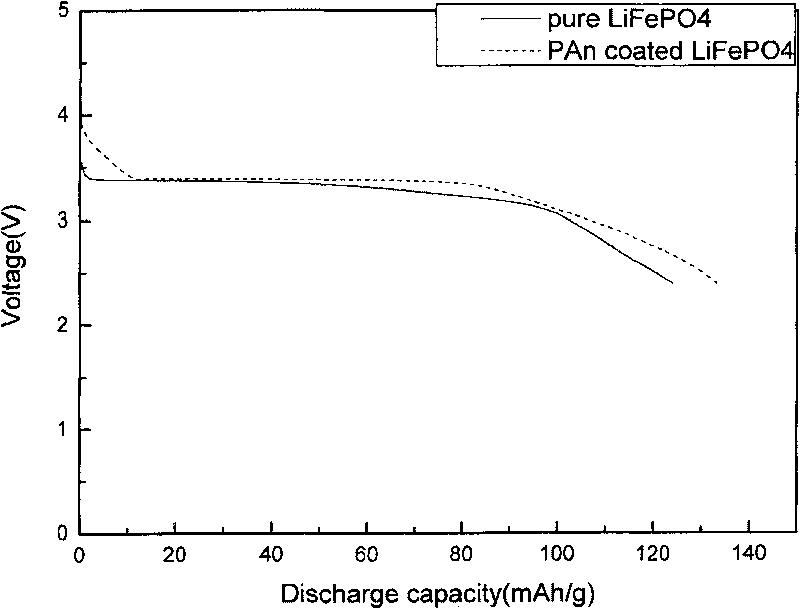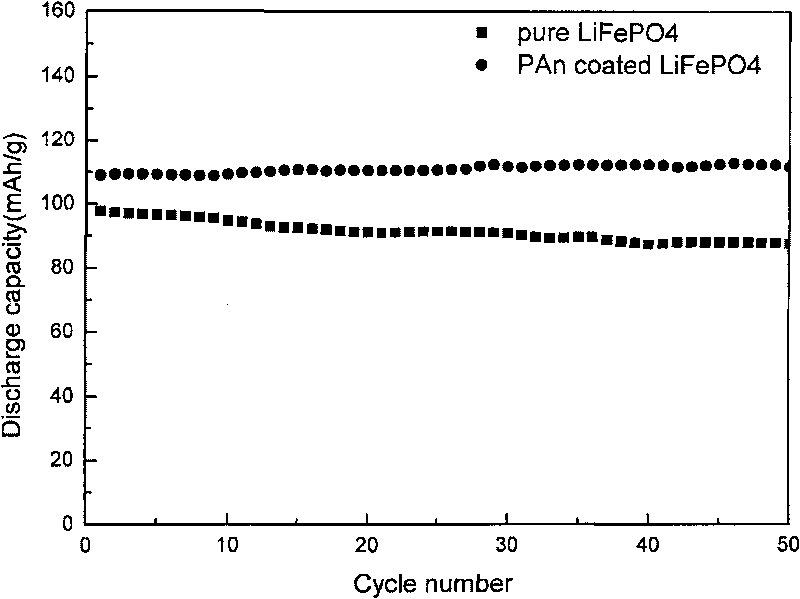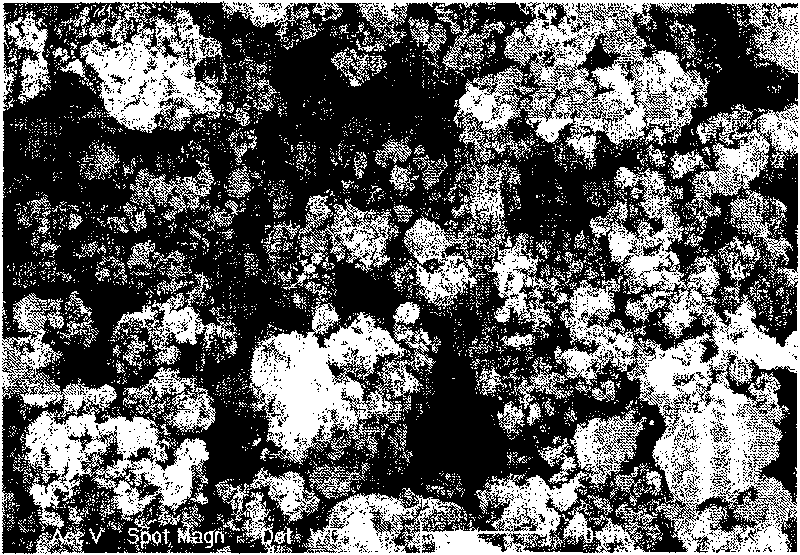Making method for positive material LiFePO4 of poly-aniline coated lithium ion battery
A positive electrode material, ion battery technology, applied in the direction of electrode manufacturing, battery electrodes, chemical instruments and methods, etc., can solve the problems of poor high-temperature cycle performance, unsafe overcharging, impossibility of large-capacity battery application, low capacity, etc., to achieve Effects of long cycle life, high specific capacity, and high discharge capacity
- Summary
- Abstract
- Description
- Claims
- Application Information
AI Technical Summary
Problems solved by technology
Method used
Image
Examples
Embodiment 1
[0021] Accurately weigh Li according to the stoichiometric ratio 2 CO 3 , FeC 2 o 4 2H 2 O, (NH 4 ) 2 HPO 4 , placed in a ball mill jar, the ratio of large and small balls is 1:4, and ball milled for 10 hours until the mixture is uniform. Then the reactant was placed in a quartz boat and put into a tube furnace to raise the temperature under the protection of argon. First raise the temperature to 300°C at 5°C / min, keep the temperature for 8 hours, then cool it down to room temperature naturally, take it out and grind it, put it in a tube furnace again, raise it to 700°C at 10°C / min, keep it warm for 20 hours, then cool it down naturally to obtain LiFePO 4 . Weigh 4 g LiFePO 4 Add the powder into 0.1mol / L HCl and stir for 30 minutes, add 1mL of aniline monomer and stir for 30 minutes, dissolve 1.28 grams of ammonium persulfate in 0.1mol / L HCl and add dropwise to the mixed solution, react at room temperature, and continue Stirring, nitrogen protection. After reacting ...
Embodiment 2
[0023] Accurately weigh Fe(NO 3 ) 3 9H 2 O, Li(CH 3 COO)·2H 2 O, dissolved in distilled water, adding excess HOCH 2 COOH, the Fe 3+ reduced to Fe 2+ , then add the stoichiometric ratio of NH 4 h 2 PO 4 , adjust the pH value to 8.5-9.2 with ammonia water, heat at 60°C for 24h to obtain a gel, heat the obtained gel, protect it with argon, pre-decompose at 300°C for 3h, grind and press it into tablets after cooling. Calcined at 600 °C for 20 h to obtain LiFePO 4 sample. Weigh 4 g LiFePO 4 Add the powder into 0.1mol / L HCl and stir for 30 minutes, add 1mL of aniline monomer and stir for 30 minutes, dissolve 1.28 grams of ammonium persulfate in 0.1mol / L HCl and add dropwise to the monomer solution, react at room temperature, Stirring was continued under nitrogen protection. After reacting for 12 hours, stop stirring, filter and wash until the filtrate is colorless. Then vacuum-dried at 60° C. to obtain polyaniline-coated lithium iron phosphate. Using a lithium sheet a...
Embodiment 3
[0025] LiFePO was prepared under the same conditions as in Example 1 4 . Weigh 4.5 g LiFePO 4Add the powder into 2mol / L HCl and stir for 30 minutes, add 0.5mL aniline monomer and stir for 30 minutes, dissolve 0.64 g of ammonium persulfate in 2mol / L HCl and add dropwise to the monomer solution, react at room temperature, and continue Stirring, nitrogen protection. After reacting for 6 hours, stop stirring, filter and wash until the filtrate is colorless. Then vacuum-dried at 60° C. to obtain polyaniline-coated lithium iron phosphate. Using a lithium sheet as the negative electrode, the first discharge specific capacity of the polyaniline-coated lithium iron phosphate at room temperature was measured to be 133mAh / g, and the capacity was still 110mAh / g after 50 cycles at 1C.
PUM
 Login to View More
Login to View More Abstract
Description
Claims
Application Information
 Login to View More
Login to View More - R&D
- Intellectual Property
- Life Sciences
- Materials
- Tech Scout
- Unparalleled Data Quality
- Higher Quality Content
- 60% Fewer Hallucinations
Browse by: Latest US Patents, China's latest patents, Technical Efficacy Thesaurus, Application Domain, Technology Topic, Popular Technical Reports.
© 2025 PatSnap. All rights reserved.Legal|Privacy policy|Modern Slavery Act Transparency Statement|Sitemap|About US| Contact US: help@patsnap.com



